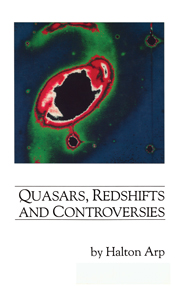Book contents
- Frontmatter
- Contents
- Preface
- Introduction
- 1 Distances of Quasars
- 2 The Battle Over Statistics
- 3 Galaxies Visibly Connected to Quasars
- 4 Certain Galaxies with Many Quasars
- 5 Distribution of Quasars in Space
- 6 Galaxies with Excess Redshift
- 7 Small Excess Redshifts, the Local Group of Galaxies, and Quantization of Redshifts
- 8 Correcting Intrinsic Redshifts and Identifying Hydrogen Clouds Within Nearby Groups of Galaxies
- 9 Ejection from Galaxies
- 10 The Sociology of the Controversy
- 11 Interpretations
- Glossary
- Index
10 - The Sociology of the Controversy
Published online by Cambridge University Press: 01 June 2011
- Frontmatter
- Contents
- Preface
- Introduction
- 1 Distances of Quasars
- 2 The Battle Over Statistics
- 3 Galaxies Visibly Connected to Quasars
- 4 Certain Galaxies with Many Quasars
- 5 Distribution of Quasars in Space
- 6 Galaxies with Excess Redshift
- 7 Small Excess Redshifts, the Local Group of Galaxies, and Quantization of Redshifts
- 8 Correcting Intrinsic Redshifts and Identifying Hydrogen Clouds Within Nearby Groups of Galaxies
- 9 Ejection from Galaxies
- 10 The Sociology of the Controversy
- 11 Interpretations
- Glossary
- Index
Summary
We are about to come to the last chapter, where we have the pleasant prospect of considering what the evidence so far discussed might mean. Before we reach that point, however, I should try to address the question of why so much opposition to this evidence has arisen. This sociology of the redshift controversy may illuminate the effectiveness of the way scientists interact in their attempts to advance knowledge.
When I first began astronomical research in the early 1950's, there were relatively few astronomers, perhaps only numbered in the hundreds of active astronomers rather than the thousands of today. But even in those days, where there was a concentration near the large telescopes on the west coast of the U.S., there was keen competition and rivalry. Some individuals attempted to protect “territory” in certain areas of research. Individuals competed for discoveries, priorities for theories, and telescope time. Of course, comradery between researchers working on different aspects of the same problem also existed as well as a certain amount of observatory loyalty and regional loyalty. What seemed to make all this very productive was that the researchers generally could follow up the most important astronomical questions, spent the great bulk of their time personally making observations, and could announce results or follow new lines of research without fear of endangering their positions. But it was always very competitive in the sense of professional recognition.
- Type
- Chapter
- Information
- Quasars, Redshifts and Controversies , pp. 165 - 172Publisher: Cambridge University PressPrint publication year: 1988



